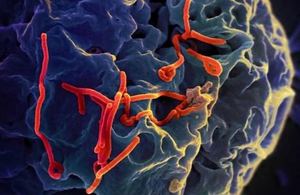NIBSC Ebola reference reagents endorsed as global standards by WHO
The Ebola reference reagents produced by NIBSC and endorsed by the WHO Expert Committee on Biological Standardisation can now be used in laboratory tests by the scientific community.

Photo by the National Institute of Allergy and Infectious Diseases
Ebola reference reagents produced by the National Institute for Biological Standards and Control (NIBSC) have been endorsed as the global standards for use in laboratory tests by the World Health Organisation (WHO) Expert Committee on Biological Standardisation and are now available to the scientific community.
NIBSC was asked by WHO to produce 2 types of Ebola reference reagents. The first is run alongside patient samples to detect Ebola infection. The second measures Ebola antibody levels following infection, or following immunisation with candidate vaccines.
The Ebola antibody standard will be used around the world in the testing of Ebola vaccines in development, and is expected to help accelerate the availability of new vaccines for this devastating disease.
Given the urgency for such materials in the midst of the Ebola outbreak in West Africa, NIBSC fast-tracked their development and production.
An international collaborative study run by NIBSC demonstrated that the use of reference reagents in laboratory tests is critical for the accurate measurement of Ebola virus and antibody, making it possible to compare results from different tests and different laboratories.
WHO coordinated the international effort to obtain the samples that were made available for the NIBSC study. The results were then scrutinized by experts convened by WHO to see if the standards would really make a difference. There was clear evidence that they do.
These standards are the equivalent of having the standard kilogram or the country code for telecommunications,” said Marie-Paule Kieny, WHO Assistant Director General for Health Systems and Innovation.
They will enable us to interpret the many Ebola studies in a more accurate way, making it easier to understand the virus today and fight it in the future.
Chief Medical Officer, Professor Dame Sally C Davies, said:
Having standard tests for Ebola and other infectious diseases is essential. It help us gain a greater understanding of the diseases so we can more effectively protect the public’s health.
I am very pleased that NIBSC has had their standards endorsed by WHO. It reaffirms their status as world-leaders, and I am thankful for all their hard work.
Dr Mike Turner, Head of Infections and Immunobiology at the Wellcome Trust, added:
Rapid, point-of-care tests for Ebola would have a huge impact on the way we study and treat the disease, and would allow infected patients to be identified, isolated and cared for as soon as possible. The standardisation of these reagents will greatly improve the accuracy of these tests and the reliability of the results we interpret from them.
Stephen Inglis, Director of NIBSC said:
I want to acknowledge the dedicated team of scientists who have worked tirelessly to produce these standards in a short time frame. This endorsement from WHO is a testament to the high calibre of work being done at NIBSC. I am also grateful for the support of Public Health England and the Wellcome Trust.
Creating a global standard for assays will minimise fragmentation and duplication of research efforts and ultimately, will improve research efficiency and effectiveness.
The reference materials are now available to be ordered through the NIBSC website
Background
- National Institute for Biological Standards and Control (NIBSC) is a world leader in assuring the quality of biological medicines through product testing, developing standards and reference materials and carrying out applied research. NIBSC is a centre of the Medicines and Healthcare products Regulatory Agency which also includes the Clinical Practice Research Datalink (CPRD). The Medicines and Healthcare products Regulatory Agency is an executive agency of the Department of Health.
Media enquiries
News centre
MHRA10 South Colonnade
London
E14 4PU
Email newscentre@mhra.gov.uk
Telephone (including out of hours): 020 3080 7651